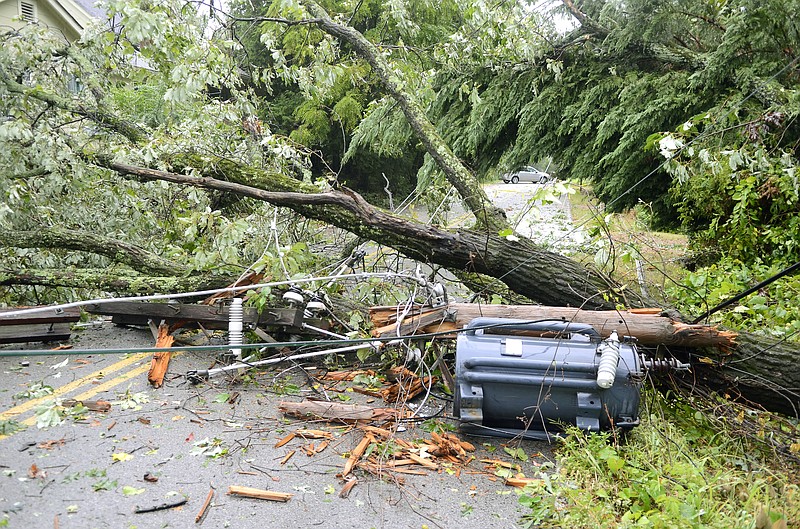MAKING MOST OF INSURANCE SERVICESRenters insurance -- Policies cover personal belongings in case of theft, disaster and cost less than homeowners insuranceAuto insurance -- Flooding is usually covered, but damage from falling objects is only covered if the owner has chosen a comprehensive policyHomeowners Insurance -- Damage stemming from falling trees is almost always covered, but flood insurance must be purchased separately. Homeowners must also consider additional living expenses when talking to their agent.Home inventory -- Maintaining a list of possessions such as furniture, appliances, clothing, utensils and anything else of value can help policyholders reclaim their items if they have insured their possessions for replacement or actual cash value. Insurers want to know the item name, room location, date of purchase and purchase price, in addition to a picture or video of each item.Source: Georgia Insurance Information Service
Rains fall, winds blow and trees capsize.
Those facts sustain a number of Chattanooga-area companies through a typical year, but 2011 has been no typical year.
Two storms in the spring, including one April 27 that set records as the most expensive and destructive in history, increased sales for storm-recovery businesses by at least a third, and as high as double 2010 sales numbers, several workers said Tuesday.
For some companies set to deal with the fallout from Tropical Storm Lee, the new work comes on top of a 10-day effort to assist an East Coast thrashed by August's Hurricane Irene.
"Our crews have been working in New York since Friday a week ago," said Brian Ismand, president of Dillard Smith Construction Co. "They're on the road now, on their way back."
Dillard assigned about 30 crews and 150 workers in April to help EPB fix downed poles, transformers and wire, though he doesn't know yet how much manpower it will take to clean up Lee's mess.
"We're sending everyone that we can, as quickly as they get back home," he said.
When the storm first hit, EPB sent about 450 contractors to restore power to nearly 59,000 homes and businesses, as the Volunteer Energy Cooperative hurried to get the lights back on for 7,000 customers.
"The heavy rains softened the ground," said Wendell Boring, EPB's assistant vice president. "When you combine that with 30 to 40 mile-per-hour winds, even healthy trees are likely to fall."
Trees Hit Home
TIPS ABOUT TREES* If a tree is excessively leaning toward your home, do not sleep in that part of the home.*If you hear something cracking in the night, don't panic, instead isolate the sound and move away from it.*Smaller trees can be secured by a homeowner with stakes and cables prior to a storm.*A professional tree service can tie cables to a large tree to secure it prior to a storm, though afterward it is too late.*Watch out for gouging: $4,000 for a tree laying on a house is average, $10,000 is probably overcharging.Source: Roberts Tree Service
Even if a falling tree misses a power line, it can still hit a house, which leads residents to call professional tree removers like Jerry Roberts, owner of Roberts Tree Service.
"Sometime yesterday [Monday], trees just started falling over," he said. "I'm probably up to 60 to 70 calls."
He had already pulled five trees off Chattanooga-area houses, and planned to finish another eight to nine jobs by Tuesday evening, he said.
The problem is that it doesn't take much wind to push down a century-old tree when the soil is soaked, he said.
"If we get any high winds at all, it could turn into a disaster zone," said Roberts, whose own house is without electricity after two large trees took out his power lines. "If it keeps drizzling and we get some gusts tonight, it would be nasty."
After major storms in February, April and now September, Roberts said that most tree service companies have seen sales jump at least 30 percent over pre-recession figures, which has been both a blessing and a curse.
On one hand, he's more profitable. On the other, a number of new companies have entered the market to seek a slice of the tree-cutting pie.
"We went down a little bit, just like everybody else did, but now we're quite a bit above the old numbers," he said. "This has been a remarkable year as far as the tree service industry."
Raining problems
After Roberts' crew finishes a job, a homeowner with a tree-sized hole in his house still has to deal with water damage.
That's where Servpro comes in.
Chris Terfloth, sales and marketing manager for two Servpro franchises in the area, already had trailers full of supplies on the way before the storm hit, he said.
"We're calling in generators from Kentucky, Georgia, Alabama and Nashville, and we still have two full crews in New Jersey with Hurricane Irene."
The franchisees saw $1 million in sales for 2010, and was on track to hit $2 million after two large storms in spring. Tropical Storm Lee should push the company up to $2.5 million in revenue, Terfloth said.
Large crews are bailing out floodwaters for Access America Transport and Southern Adventist University, in addition to handling more than 40 residential calls, he said.
"We have 80 dehumidifiers and 200 air movers, and every bit of equipment is out right now," he said.
Hiring temporary workers helps with short-term staffing needs, but the real problem is electricity. Homes with no power can't run the dehumidifiers and fans necessary to evaporate the last 20 percent of water that workers can't remove with their high-powered vacuum cleaners.
"We can come in and extract the water, but can't put in drying equipment," he said.
And after 72 hours, bacteria starts to grow.
"We've had people getting ill and not knowing why," Terfloth said. "What you'll start to see is wallpaper will start to peel, fan blades will start to droop, and then you're gonna have mold."
